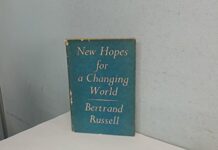
Ebook Info
- Published: 2017
- Number of pages: 148 pages
- Format: EPUB
- File Size: 0.36 MB
- Authors: Bertrand Russell
Description
A detailed study of China’s economic; political and cultural history; renowned philosopher and scholar Bertrand Russell’s book ‘The Problem of China’ can be read by social sciences scholars and economists interested in studying this region of diverse continent Asia.
User’s Reviews
Reviews from Amazon users which were colected at the time this book was published on the website:
⭐In 1920 Bertrand Russell moved to China for one year to serve as Professor of Philosophy at the University of Beijing. The Manchu Dynasty had been overthrown in 1911. Although Sun Yet Sen had become the nominal leader of China, the political situation was chaotic.In 1840 Great Britain had defeated China in the Opium War. With its victory Britain won the right to sell opium in China. The Manchu government had been trying to stop that because opium was causing problems with the Chinese who became addicted to it.How would Americans feel if an alliance of Latin American countries had won a war against the United States to achieve the right to sell cocaine and heroin in the U.S.? That is how the Chinese felt.After the Opium War China became a target for any imperialist country looking for a soft touch. The British seized control of Hong Kong and Burma. The French took control of Indochina. Burma and Indochina had been under Chinese suzerainty. In a war of 1894 – 95 Japan defeated China, winning Korea and coal and iron concessions in China.When Bertrand Russell taught in China the European countries were leaving China alone. Japan had become the new bully on the block. Russell describes Japan’s situation with understanding, although not sympathy.When Admiral Perry forced the opening of Japanese ports to American shipping in 1852 the Japanese realized that if they were to resist Western imperialism and perhaps conquest they would need to develop a powerful military. A powerful military would require industrialism. Industrialism would require iron ore and coal. Japan lacked iron and coal reserves. China had both. The Japanese decided to take some of China’s iron and coal, and did.After Admiral Perry’s uninvited visit the Japanese quickly formed a powerful government, which China had been unable to do after the overthrow of the Manchu Dynasty. Thus, Japan was able to develop faster than China.The Problem of China could have better been entitled The Problems of China. Lord Russell did not see China as a problem, but as a decent country beset by problems caused by military weakness.Russell had opposed Britain’s entry into the First World War. He did think a country had the right to defend itself from foreign aggression. For China this would require a powerful military. This in turn would require a strong government and industrialization. China had little industry when Russell visited the country. Russell thought China had much potential for industry.Russell hoped that the Chinese would develop a democratic government. This would require free public education. At the time Russell lived in China the weak and poorly financed government lacked the ability to educate the country. Nevertheless, Russell said young people in China valued the opportunity to be educated. The Chinese respected people with education.Russell admired Chinese culture, and thought it was more conducive to widespread happiness than what existed in the West. Nevertheless, he did see problems with Chinese civilization. The Chinese valued large families. This led to periodic famines when crops failed. Well meaning people in the West tried to alleviate the famines with food aid. This resulted in more people to feed during the next famine. The adoption of modern agricultural methods would increase food production. That would delay the next famine, but it would occur without efforts to curb population growth. Unlike others on the left, Russell accepted the insights of Robert Malthus.https://www.amazon.com/gp/customer-reviews/R1IY1VEFX6FPPN?ref=pf_ov_at_pdctrvw_srpAnother problem Russell saw with Chinese civilization was that government officials were usually corrupt by Western standards. The Chinese thought a man had more responsibility to his family than his country. Chinese officials tried to extract as much money as they could to distribute it to family members.Russell had little respect for Confucius. The Analects of Confucius is a fairly short document. One can read it in one or two sittings. I review it for Amazon here:https://www.amazon.com/gp/customer-reviews/R26OFXSOYZFGKY?ref=pf_ov_at_pdctrvw_srpConfucius took inequality for granted, but he thought those with power over others had moral responsibilities to them. I see his as the philosophy of the benevolent boss. Confucius also wrote about religious matters. He thought that one should worship the deities in the traditional manner as though they exist, but that one should avoid religious dogmatism. When we consider the history of religion in the West it is easy to agree.I would rather be governed by rulers who based their governing philosophy on the philosophy of Confucius than rulers who admired Adolf Hitler or Ayn Rand.China has finally developed the strong government and strong military Lord Russell hoped they would. The rest of the world has stopped bullying China. Unfortunately, democracy has eluded the mainland. Nevertheless, the example of Taiwan demonstrates that democracy would work well on the mainland.The American people never had to choose between personal freedom and national survival. The Chinese people had to make that choice. And they did.
⭐Fairly interesting take on China when it was still a weak nation suffering from civil war. What’s more, Russell seems to see China and other East Asian countries in clearer terms than many ‘experts’ you see on mainstream media at present.
⭐Bertrand Russell gives an in-depth account and analysis of the problems faced by China during the early 20th century. While analyzing the dynamics at play on the global front, he also attempts to identify the three most pressing issues which China faced internally–the need for an orderly government, industrial development under Chinese control and the spread of education. Notwithstanding the fact that he is a Westerner, he strives to debunk myths and prevailing misconceptions of the Chinese people. Russell writes elegantly and this book is indeed a remarkable account for those who wish to learn more about China.
⭐It does not cover recent China, but I wanted a pre-communist history. This has good insights into culture and especially the differences between China’s cultural values and nature and Western values. These insights are as pertinent today as they were then. Maybe even more so as we develop more interactions between east and west.Jim H
⭐Bertrand Russell goes in specific details with the information and technology available at the time to compelled a rigorous analysis of the Chinese political state of the 1920’s to provide pragmatic solutions to the challenges of that great nation. From the importance to draft the constitution, invest in education, create a strong government and defense army to the industrialization.
⭐This is a great book. A lot of information is dated by now (such as the population and geography of China), of course, but looking back, I see that Russell’s understanding of China and prediction about China’s future is amazingly correct. His discussion on China’s relationship with Japan and the Chinese civilization is also very informative and interesting. He also wrote this book with sympathy — an outsider trying his best to understand a foreign culture with a humble heart — which, unfortunately I rarely see in books on China (in English) nowadays.
⭐A bit wordy, but it seems that was the style of the time. However, it was extremely insightful of the Chinese character, as well as the Japanese and European character.
⭐The predictions of China is fascinating. It’s really a rare thing that the author, though a Westerner, showed respect for the seemingly uncivilized country.Suitable learning material for a English learner.
⭐Arrived as described – in new covdutionnsnf in time
⭐It’s one of the best books to understand Chinese culture from an outsider’s view — an really brilliant outsider indeed. As a Chinese, I have to say Russell really understood and explained Chinese culture very well, its treasure and its problems. It’s good to read such a book by a great mind to search your nation. And Amazon’s shipping is efficient and perfect, thanks!
⭐The book of telling the truth, learned a lot from this in terms of knowing the merits of different culture
⭐Why read a book about China published in the 1920s to try to understand today’s China? The answer is simple: Bertrand Russell.In The Problem of China, Russell, one of the great minds of the 20th century, offers a study of China and its relationships with the world and particularly Japan at the beginning of the last century. China no doubt has changed since, but Russell’s understanding of this country and its people was such that he was able to extract its key cultural, demographic and economic features and make incredibly accurate predictions on its future place in the world.Russell surely understood China well, probably better than any modern living author who wrote on the subject, giving the reader a compelling argument for grabbing a copy of this book and start learning about this complex nation on the right foot.
⭐Interesting Read
Keywords
Free Download The Problem of China in EPUB format
The Problem of China EPUB Free Download
Download The Problem of China 2017 EPUB Free
The Problem of China 2017 EPUB Free Download
Download The Problem of China EPUB
Free Download Ebook The Problem of China





